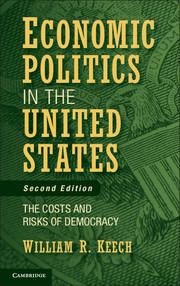Book contents
- Frontmatter
- Contents
- List of Figures and Tables
- Preface to the Second Edition
- Preface to the First Edition
- Part One Introduction
- Part Two Models of Macroeconomic Politics in a Democracy
- Part Three The Sources and Authority of Macroeconomic Goals
- Part Four Institutions and Processes
- Part Five Conclusion
- References
- Index
Preface to the Second Edition
Published online by Cambridge University Press: 05 June 2014
- Frontmatter
- Contents
- List of Figures and Tables
- Preface to the Second Edition
- Preface to the First Edition
- Part One Introduction
- Part Two Models of Macroeconomic Politics in a Democracy
- Part Three The Sources and Authority of Macroeconomic Goals
- Part Four Institutions and Processes
- Part Five Conclusion
- References
- Index
Summary
This is a second edition of Economic Politics: The Costs of Democracy (Cambridge University Press, 1995). That book used macroeconomic performance since World War II in the United States to make general statements about democracy. The main conclusions were that democracy had basically benign influences on economic policy and performance. Political economy and public choice models of opportunistic behavior by politicians did not identify systematically inferior policy, as had been suggested or intimated by Nordhaus (1973), Tufte (1978), and others.
I am no longer so optimistic. In the intervening years, the United States has taken a wrong turn economically, and I believe that the wrong turn has much to do with the incentives of democratic politics. But these developments are not inevitable features of democracy. They are often avoided by other democratic nations and have been avoided in the past by the United States.
I have changed the title of the book to Economic Politics in the United States: The Costs and Risks of Democracy. Such a title might have been a more honest title of the original book, given its predominant focus on the United States, but the revised title highlights the fact that democratic politics have gone astray in that country. This book will consider democratic politics in the United States as just one example of how democracy can work constructively or otherwise in the context of economic policy making and performance.
- Type
- Chapter
- Information
- Economic Politics in the United StatesThe Costs and Risks of Democracy, pp. xiii - xviPublisher: Cambridge University PressPrint publication year: 2013

